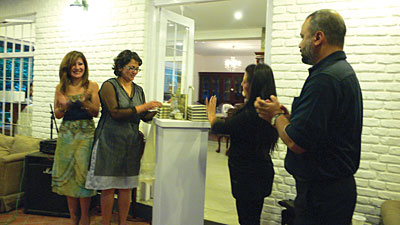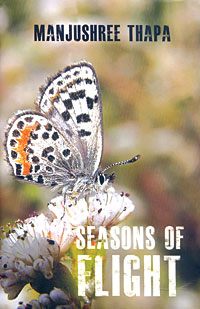 COMING HOME: Manjushree Thapa unveils her new novel Seasons of Flight at Ramalaya, Panipokhari, Sunday |
So this country of emigrants finally gets some immigrant literature in English. It's only fitting that Seasons of Flight comes from Manjushree Thapa, perhaps the most accomplished of Nepali writers who have published fiction in English.
Seasons of Flight is the 'zigzag' tale of a young Nepali woman, Prema, whose life follows a butterfly-like trajectory in every sense of the word. She flits from her village in eastern Nepal to Kathmandu, then to a job in the west of the country, and thence to Los Angeles, courtesy of the green card lottery. She flits from her job as a forester in Nepal to restaurant work and taking care of an elderly lady to conservation again. She flits also from person to person, Nepalis to emigrant Nepalis to Americans, from her lover Rajan in Nepal to attachments both serious and casual in America. And unsurprisingly, she is dissatisfied with her lot.
The book puts one in mind of Thapa's most recent collection of short stories, Tilled Earth. Not simply for its smooth, practised prose and the abundance of charming, touching episodes. But also because of the way the novel is put together. The short chapters of Seasons of Flight are morsels unto themselves, illuminating as they do particular aspects of Nepalipan abroad, such as Prema's encounters with Americans ignorant of Nepal, and the mundaneness of working menial jobs to get by. But does this add up to a substantial repast along the well-worn lines of immigrant literature?
One cannot help but think Manjushree Thapa, herself prone to considerable migratory flight, is addressing herself rather more to an audience outside Nepal. The very first chapter, 'being nepali', suggests as much. Many Nepalis will nod and smile as they read about Prema's encounters with foreigners who think Nepal is Naples. But is evoking the familiar enough to provoke deep reflection on why and how people migrate?
 |
Seasons of Flight is a serious attempt to delve into the journey of life across time, space and human society. Undoubtedly it will speak to many Nepalis who have experienced the pleasure and pain of leaving one's home behind and seeking another. It will also reach those who may have wondered, however fleetingly, what the lives of the Other in their own cities are like. Thapa manages to capture the nuances of America and its variegated social and physical landscape, as seen through the eyes of Prema. What invisible lines lie between the native and the interloper, and how fluid are these identities? As an addition to the corpus of immigration literature, Seasons of Flight makes for absorbing reading.
Manjushree Thapa's Seasons of Flight is published by Penguin/Viking and is available at major bookstores in Kathmandu.
Hardback price: Rs 638
READ ALSO:
Urban Crush, Suvayu Dev Pant and Dewan Rai
Circus slave, Clare Harvey
Sandcastle city/ quicksand nation, Wayne Amtzis
Fad for foodies, Duksangh Sherpa
Robbing Karnali, Toofan Neupane
Love and betrayal


